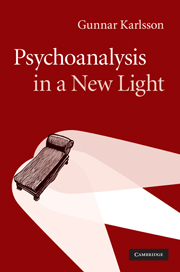Book contents
- Frontmatter
- Contents
- Preface
- Acknowledgements
- List of figures
- 1 Phenomenology and psychoanalysis
- 2 The life-world as the ground for sciences
- 3 A critical examination of neuropsychoanalysis
- 4 The conceptualization of the psychical in psychoanalysis
- 5 The libido as the core of the unconscious
- 6 The grounding of libido in the life-world experience
- 7 Beyond the pleasure principle: the affirmation of existence
- 8 The question of truth claims in psychoanalysis
- Concluding remarks
- References
- Index
1 - Phenomenology and psychoanalysis
Published online by Cambridge University Press: 05 June 2012
- Frontmatter
- Contents
- Preface
- Acknowledgements
- List of figures
- 1 Phenomenology and psychoanalysis
- 2 The life-world as the ground for sciences
- 3 A critical examination of neuropsychoanalysis
- 4 The conceptualization of the psychical in psychoanalysis
- 5 The libido as the core of the unconscious
- 6 The grounding of libido in the life-world experience
- 7 Beyond the pleasure principle: the affirmation of existence
- 8 The question of truth claims in psychoanalysis
- Concluding remarks
- References
- Index
Summary
At first sight it may appear as if phenomenology and psychoanalysis are opposites. The phenomenological project is concerned with studying consciousness, whereas the field of investigation for psychoanalysis is the unconscious. Freud (1900: 613) describes the unconscious as ‘the true psychical reality’, and in a well-known metaphor the role of consciousness is limited to the top of an iceberg. One can, in fact, ask: what do these sciences have to do with one another? This question can be answered in different ways. The aim of this book is to discuss the field of psychoanalysis and its basis as science, and for that purpose I believe that phenomenology has the greatest relevance. The impression that phenomenology and psychoanalysis are antithetical changes when one considers the dependence on consciousness for psychoanalytic practice. Psychoanalysis cannot liberate itself from consciousness, owing, among other things, to the fact that the psychoanalytic process both begins with the self-understanding of the analysand and is driven by means of conscious validations and verifications of interpretations of the unconscious. And clinical experience is an important basis when one attempts to characterize the field of psychoanalysis and its scientific ground.
In this chapter I will discuss briefly how I conceive of the relationship between phenomenology and psychoanalysis, and say something about how phenomenology will be used in this work. For the reader who is not familiar with phenomenology, this chapter can serve as an introduction to phenomenological philosophy. From a historical perspective there are some interesting similarities between those two movements.
- Type
- Chapter
- Information
- Psychoanalysis in a New Light , pp. 1 - 20Publisher: Cambridge University PressPrint publication year: 2010



